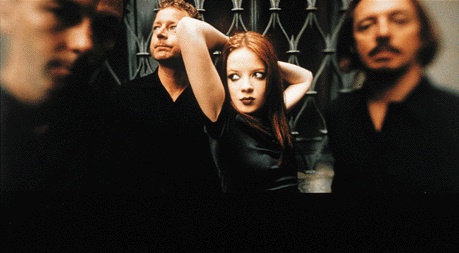

Garbage: Only Happy When it Rains...
With infectious hooks, smooth as silk vocals, and an almost mesmerizing rhythm, Garbage took the music world by storm last year with their debut single, "Queer." The single, off of their self-titled debut album, was a mainstay on MTV's "120 Minutes" and in was in their "Buzz Bin" for months. Now Garbage has returned to the fray folowing the success of their third single, "Stupid Girl," and is in the process of recording a follow-up album.
Garbage is a result of collaborations that began more than a decade ago between Duke Erikson, Steve Marker, and producer Butch Vig. The latter two are partners in Smart Studios, which was founded in 1984 and gained prominence for producing the demos for Nirvana's breakthrough album "Nevermind." Vig has also produced for such alternative music notables as Sonic Youth and the Smashing Pumpkins, and the trio has done remixes for the likes of Depeche Mode, Nine Inch Nails, House of Pain, and U2. The three started Garbage in 1993 as just another fun project, yet only when Shirley Manson was brought in on vocals did they develop past their original plan into an actual band.
Manson, who Vig has said "sometimes sounds scary, sometimes dreamy, sometimes sexy, sometimes psychotic," is a veteran of the European pop scene. The Edinburgh, Scotland native first started in music at 16. She was approached by a friend of hers who needed a back-up singer in his band. "He wanted my body, and I wanted his as well, so a hearty alliance was built," laughed Manson in a recent telephone interview with Brainchild. A year later she hooked up with the band Goodbye Mr. Mackenzie as a vocalist and keyboard player and took to touring the continent and releasing a few albums. The band eventually lost it's record deal, which lead to a lot of soul searching for Manson and the eventually formation of her band Angelfish. Garbage discovered Manson on MTV's "120 Minutes" when they saw the band's video for "Suffocate Me" and decided to track her down.
"They invited me to initially sing on a track or two," recalls Manson. "I found that I loved working with the guys in the band and soon I became a part of the mix." What she brought to the mix she isn't exactly sure, but she notes, "I'm more emotional than the other three, much more of a fireball. They're all kind of laid back, and I'm much more feisty and more likely to say what I feel." An example was the song "Queer," one of the first songs the band worked on. "When I first heard it, there were no lyrics, and the vocal line was being sung through distortion. It was a really messed up sound," laughed Manson. She in turn took the song and "softened it, gave it a a bit of a European hip-hop vibe" and a hit single was born. Making the album was a bit uneasy for Manson, who didn't really even know the other members of the band all that well, and for Vig. "I think we felt very pressured by this album. We knew because of the high profile of Butch, people would expect a lot," said Manson. "I think having him caused more doors to be shut than opened, like people were ready to dislike us. When they heard it though, we were pleasantly surprised by all the success."
One difficulty the band has had is trying to shake their "studio band" image. "I can understand why people might think we're a studio band. And to be fair, when we first started the band, we had no intentions of ever touring because we thought it would be very phony of us to get up on stage and try to act like a band, " explained Manson. However, through the course of making the album and videos, the band "felt we'd developed a chemistry between us and wanted to tour," said Manson. The band's success has been fueled by a consistant prescence on MTV, which Manson views as having it's good side and bad side. "MTV is a strange phenomena. One week you loathe it, and the next week you love it. It exposes your work and allows you to play great places in front of people who know your music, but it also may cause people to get burned out" said Manson, though she added, "I have to admit, it's a huge thrill to come from Scotland and see my video on MTV in America."
The band received a resurgence of popularity with the release of their second video, "Only Happy When it Rains," which they were quite happy with. "It's very different from the Queer video. It's very much a performance video, and I think it's very simple and beautiful," said Manson, who had wanted to be an actress prior to her jump to the music industry. Manson loves her new career, but doesn't rule out giving acting a try some day. "I think there's a sad little flaw in my character that makes me want to escape reality now and again," said Manson," but being in a band is not always like living in the real world, so I'm content."
